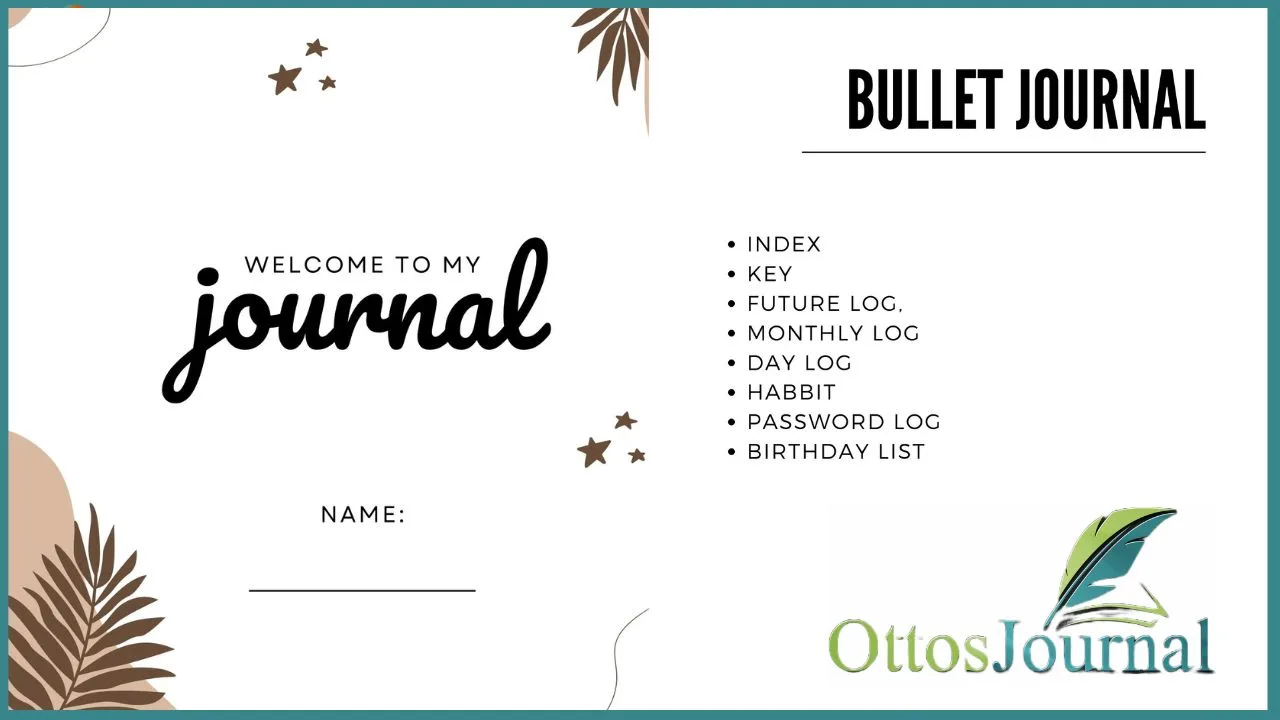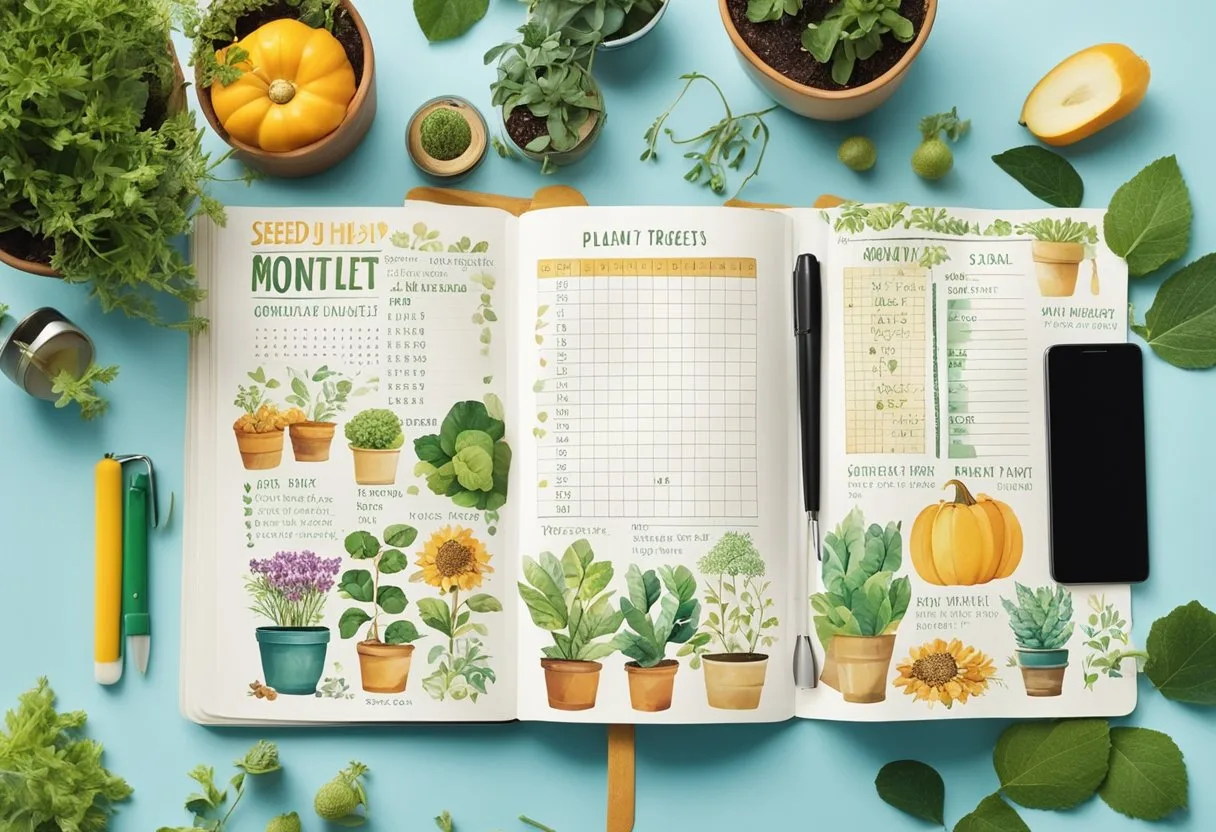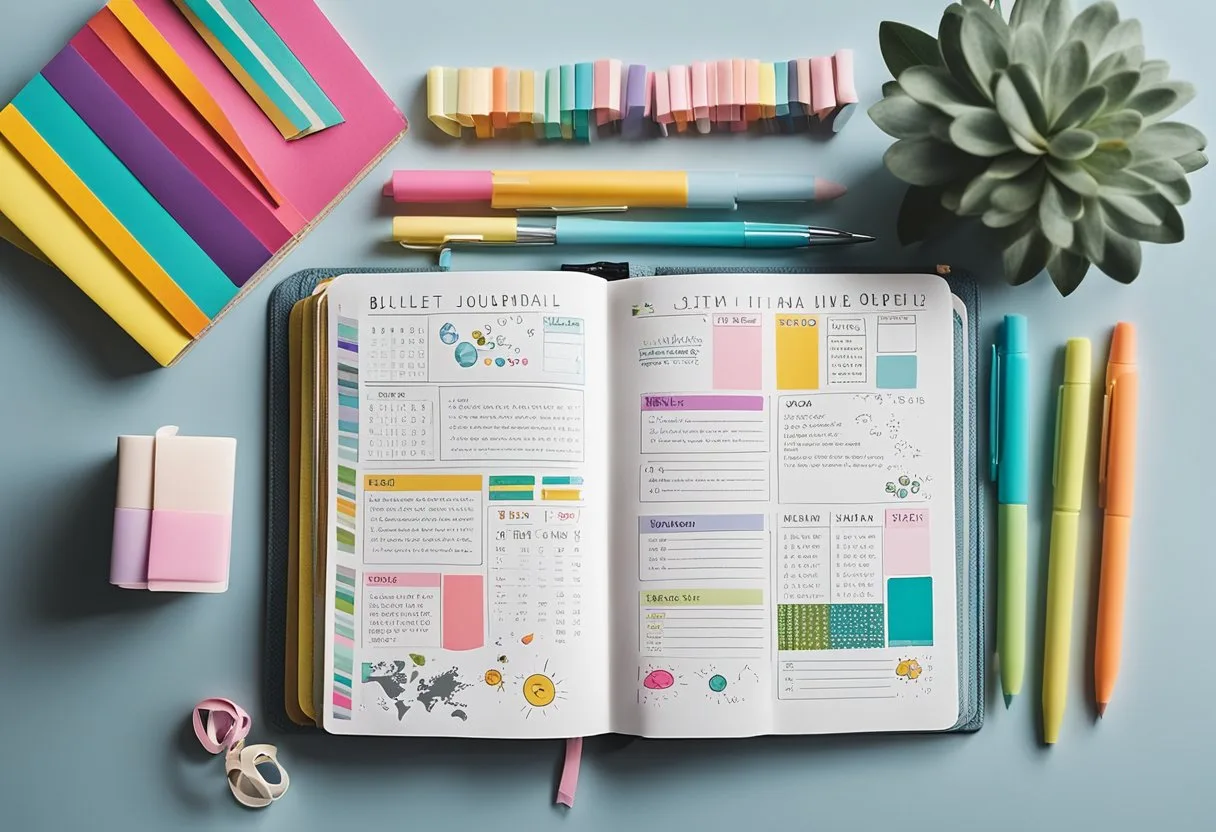In our fast-paced and digitally-driven world, finding effective ways to manage our time, stay organized, and prioritize self-care has become increasingly important. One method that has gained significant popularity in recent years is bullet journaling. This versatile and customizable system combines the traditional aspects of journaling, to-do lists, and planning, offering a wide range of benefits for individuals from all walks of life. In this article, we will explore the benefits of bullet journaling, how to get started, different layouts to try, and the personalization possibilities it offers.
What is Bullet Journaling and How to Get Started
Bullet journaling is a unique system that combines elements of a planner, diary, and to-do list into one organized notebook.
It was developed by Ryder Carroll as a flexible method for individuals to keep track of their tasks, events, goals, and thoughts in a structured manner.
The core idea behind bullet journaling is rapid logging, which involves using bullet points to categorize entries, making it easy to locate and track information.
To get started with bullet journaling, all you need is a blank notebook and a pen. Begin by setting up an index page to create a table of contents for future reference.
Next, establish a future log, where you can jot down upcoming events, appointments, and long-term goals.
This log acts as a snapshot of what’s ahead and helps you plan effectively. From there, you can create monthly, weekly, and daily logs to capture tasks, appointments, and important reminders.
The beauty of bullet journaling lies in its flexibility, allowing you to design and structure your pages based on your unique needs and preferences.
The Benefits of Bullet Journaling
Enhanced Time Management
One of the significant bullet journal benefits is its ability to improve time management. By providing a comprehensive overview of your schedule, deadlines, and commitments, bullet journaling enables you to prioritize tasks effectively and allocate time accordingly.
With the help of monthly, weekly, and daily logs, you can plan your days with intention, ensuring that essential tasks are completed while avoiding overwhelm and procrastination.
Increased Productivity and Goal Achievement
Bullet journaling serves as a powerful tool for boosting productivity and achieving your goals. By breaking down your goals into manageable tasks and tracking your progress, you gain a sense of accomplishment and motivation.
With the ability to review past months and weeks, you can identify patterns, assess what worked and what didn’t, and make adjustments to optimize your productivity and achieve your long-term aspirations.
Enhanced Organization and Clarity
Keeping a bullet journal promotes organization and clarity in both your personal and professional life. The structured system allows you to declutter your mind by transferring thoughts, ideas, and tasks onto paper.
By centralizing all your information in one place, you eliminate the need for multiple notebooks or apps, making it easier to find what you need quickly.
The index and page numbering system further aid in organization, ensuring that nothing gets lost or overlooked.
Improved Self-Awareness and Reflection
Bullet journaling encourages self-awareness and reflection, fostering personal growth and mindfulness.
Through the practice of journaling, you can gain insights into your emotions, thoughts, and behaviors.
Regularly reviewing your entries can help you identify patterns, triggers, and areas for improvement.
Additionally, bullet journaling provides a safe space for self-expression, allowing you to explore your creativity and document your journey.
Reduce Stress and Anxiety
In today’s fast-paced world, stress and anxiety have become prevalent issues. Bullet journaling offers a therapeutic outlet for managing and reducing these negative emotions.
The act of writing things down can help alleviate stress by offloading mental burdens and providing a sense of control.
By incorporating self-care activities, such as mood trackers, habit trackers, and gratitude logs, you can cultivate mindfulness, promote relaxation, and nurture your overall well-being.
Customization and Creative Expression
One of the unique aspects of bullet journaling is the opportunity for personalization and creative expression.
Unlike pre-designed planners, bullet journals allow you to create layouts, designs, and themes that resonate with your style and preferences.
From choosing your favorite stationery to experimenting with various art mediums, such as washi tape and stickers, you can make your journal a reflection of your personality, making the process enjoyable and inspiring.
Improved Decision-Making and Problem-Solving
Bullet journaling can enhance your decision-making and problem-solving abilities. By recording and analyzing your past experiences, you can learn from them and make more informed choices in the future.
Journaling about challenges or dilemmas enables you to explore different perspectives, weigh pros and cons, and generate creative solutions.
The act of writing things down provides clarity and structure, allowing you to approach problems with a focused and organized mindset.
Accountability and Tracking Progress
When it comes to personal growth and habit-building, accountability plays a vital role. Bullet journaling helps you stay accountable to yourself by providing a visual representation of your progress.
With habit trackers and goal trackers, you can monitor your behaviors and achievements, celebrating milestones and making adjustments as needed.
The act of tracking progress fosters motivation, consistency, and a sense of responsibility, propelling you closer to your desired outcomes.
A Creative Outlet for Small Joys
Life is composed of both big milestones and small joys. Bullet journaling offers a creative outlet for capturing and cherishing these moments.
Whether it’s documenting a memorable quote, sketching a beautiful scene, or noting down a delightful experience, your journal becomes a treasury of positivity and gratitude.
By consciously acknowledging and celebrating the small joys, you cultivate a mindset of appreciation and mindfulness, enriching your daily life.
Personalization:
One of the many benefits of bullet journals is the ability to make it a personal journal. You can customize it based on your own style using a bullet point.
You can focus your journal on keeping track of tasks such as birthdays, appointments, or important reminders. You also have the freedom to add creative elements like sketches and doodles.
Different Types of Layouts for the Perfect Bullet Journal
One of the appealing aspects of bullet journaling is the variety of layout options available. Here are a few popular layouts you can experiment with:
1. Monthly Log:
The monthly calendar layout provides an overview of the entire month, allowing you to note down important events, deadlines, and goals.
2. Weekly Spread:
A weekly spread breaks down your week into manageable sections, providing space to list tasks, appointments, and personal reminders.
3. Habit Tracker:
A habit tracker is a visual representation of your habits, enabling you to monitor and track your progress in areas such as exercise, reading, or self-care.
4. Mood Tracker:
A mood tracker allows you to record and track your emotions on a daily, weekly, or monthly basis, helping you identify patterns and triggers.
5. Gratitude Log:
A gratitude log is a space for you to express appreciation for the positive aspects of your life, promoting a sense of well-being and contentment.
Simple & Creative Ideas to Personalize Your Journal
Personalizing your bullet journal adds an extra layer of enjoyment and engagement. Here are a few ideas to spark your creativity:
1. Use Color:
Experiment with colored pens, markers, or highlighters to add visual interest and categorize different types of entries.
2. Incorporate Washi Tape:
Decorative washi tape can be used to create borders, separate sections, or add a pop of color to your pages.
3. Doodle and Illustrate:
If you enjoy drawing, try adding small illustrations, doodles, or sketches that represent your mood or the theme of the page.
4. Use Stickers:
Stickers can be a fun and easy way to add visual elements to your journal. They can be used for headers, labels, or decorative accents.
5. Explore Lettering:
Practice different lettering styles, such as brush lettering or calligraphy, to add a touch of elegance to your journal.
Remember, the key is to experiment and find what brings you joy and enhances your journaling experience.
Why is Bullet Journaling Good for You?
Bullet journaling offers numerous benefits that contribute to your overall well-being and personal growth. It provides a sense of structure and organization in your life, empowering you to manage your time effectively and prioritize tasks.
It fosters self-awareness, reflection, and creativity, allowing you to explore your thoughts, emotions, and aspirations.
By reducing stress and anxiety, bullet journaling promotes mental health and self-care. It also serves as a tool for accountability, tracking progress, and achieving your goals.
Bullet journaling is good for you because it helps you navigate through life with intention, purpose, and joy.
What is the Psychology Behind Bullet Journaling?
The psychology behind bullet journaling can be attributed to several key factors. Firstly, the act of physically writing things down has been shown to enhance memory and cognitive processing.
When you write, you engage multiple senses and create a stronger connection to the information, leading to improved retention and comprehension.
Additionally, bullet journaling provides a sense of control and agency, allowing individuals to actively plan, organize, and reflect on their lives.
This sense of control promotes feelings of empowerment, reducing stress and anxiety. Furthermore, the creative aspect of bullet journaling taps into the therapeutic benefits of artistic expression, promoting mindfulness, relaxation, and self-discovery.
Is a Bullet Journal Good for Mental Health?
Yes, a bullet journal can be highly beneficial for mental health. The act of journaling itself has long been recognized as a therapeutic tool for managing emotions, reducing stress, and promoting self-reflection.
By incorporating elements such as mood trackers, gratitude logs, and self-care activities, bullet journaling takes mental health support to a deeper level.
It provides a safe and non-judgmental space for individuals to process their thoughts and emotions, identify triggers and patterns, and cultivate self-awareness.
The customizable nature of bullet journaling allows individuals to tailor their journaling practice to their specific mental health needs, fostering resilience, self-care, and personal growth.
How Has Bullet Journaling Changed My Life?
Bullet journaling has the potential to make a profound impact on an individual’s life. Personally, it has transformed the way I approach time management, productivity, and self-care.
By implementing the bullet journaling system, I have gained clarity and focus in my daily life, allowing me to prioritize tasks and set achievable goals.
It has become a powerful tool for reflection, enabling me to identify patterns, learn from past experiences, and make more informed decisions.
Moreover, bullet journaling has become a creative outlet, providing a sense of joy and self-expression. Overall, it has empowered me to lead a more intentional, organized, and fulfilling life.
Why You Will Quit Bullet Journaling?
While bullet journaling offers numerous benefits, it’s important to acknowledge that it may not be the perfect fit for everyone. Here are a few reasons why someone might quit bullet journaling:
1. Lack of Consistency:
Maintaining a bullet journal requires regular attention and commitment. If someone struggles to consistently update their journal or finds it burdensome, they may choose to discontinue using it.
2. Overwhelming Complexity:
Bullet journaling offers great flexibility, but for some individuals, the freedom to create layouts and designs can be overwhelming. The pressure to make the journal perfect can lead to frustration and eventual abandonment.
3. Time Constraints:
In our busy lives, finding time to dedicate to bullet journaling can be challenging. Some individuals may find it difficult to carve out the necessary time for planning and maintaining their journals.
4. Digital Preferences:
With the rise of digital planning and productivity tools, some individuals may prefer the convenience and accessibility of mobile apps or online platforms over a physical bullet journal.
5. Incompatibility with Personal Style:
While bullet journaling encourages customization, it may not align with everyone’s personal preferences or creative outlets. Some individuals may find other methods of organization or self-expression more suitable for their needs.
It’s important to remember that quitting bullet journaling does not imply failure. Everyone’s journey is unique, and finding a system that works for you is what truly matters.
What Are the Disadvantages of Bullet Journals?
While bullet journaling offers numerous advantages, it’s essential to acknowledge the potential disadvantages as well. Here are a few areas where bullet journaling may present challenges:
1. Learning Curve:
Getting started with bullet journaling can be overwhelming, especially for those who are new to the system. Learning the symbols, layouts, and organizational structure may require time and effort.
2. Perfectionism Pressure:
The creative aspect of bullet journaling can sometimes lead to perfectionism. The desire to create aesthetically pleasing pages can become stressful and time-consuming, detracting from the primary purpose of the journal.
3. Time Investment:
Bullet journaling, especially when accompanied by elaborate layouts and decorative elements, can be time-consuming. For individuals with busy schedules or limited time, maintaining a bullet journal may become burdensome.
4. Risk of Abandonment:
Without consistent commitment and routine, there is a risk of abandoning the bullet journaling practice altogether. If someone fails to see the desired results or loses interest, they may give up on the system.
5. Limited Digital Integration:
Bullet journaling primarily relies on pen and paper, which may not be compatible with individuals who prefer digital tools or those who rely heavily on technology for organization and planning.
Understanding these potential disadvantages can help individuals make an informed decision about whether bullet journaling aligns with their needs and preferences.
Bottom line:
Bullet journaling offers a wide array of benefits, including enhanced time management, increased productivity, improved organization, self-awareness, reduced stress, and creative expression.
It can be a valuable tool for personal growth, goal achievement, and mental health support.
Whether you’re a seasoned journaling enthusiast or just starting your journey, exploring the world of bullet journaling can be a transformative experience with long-lasting benefits.





